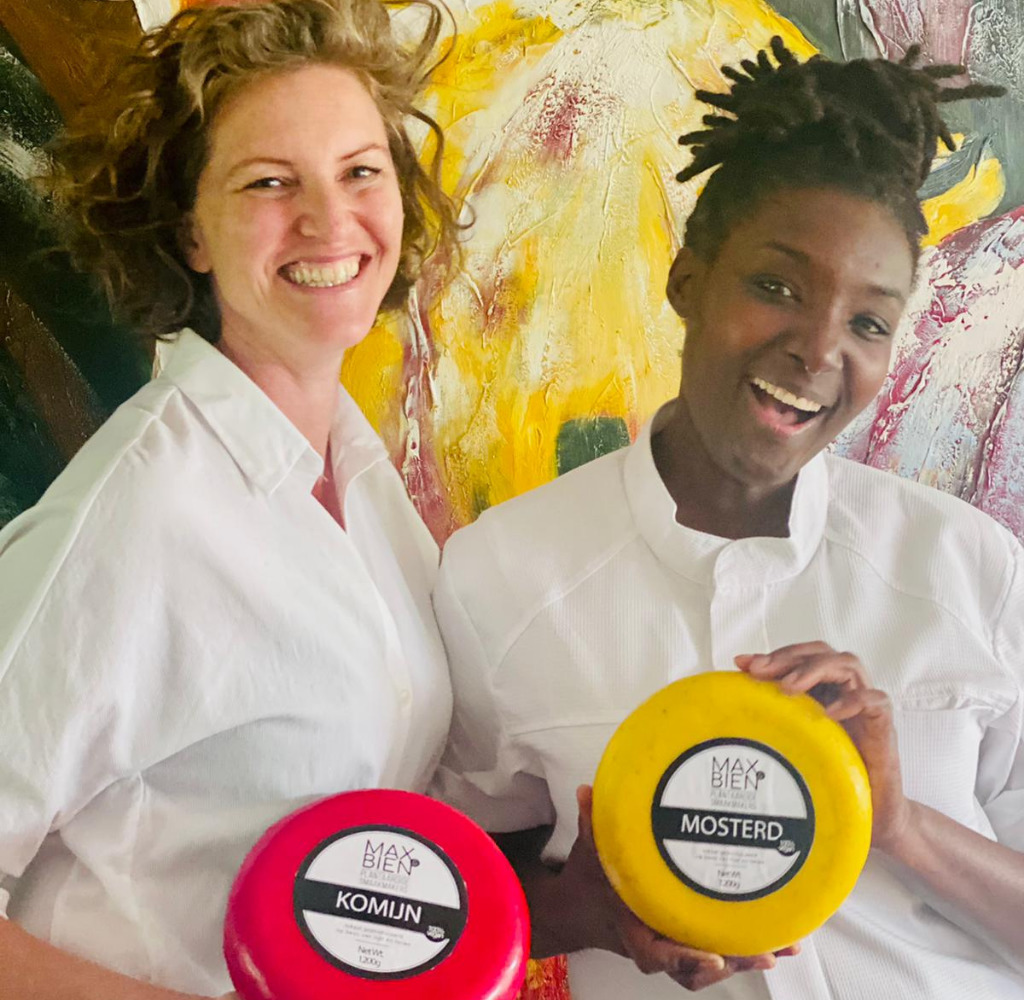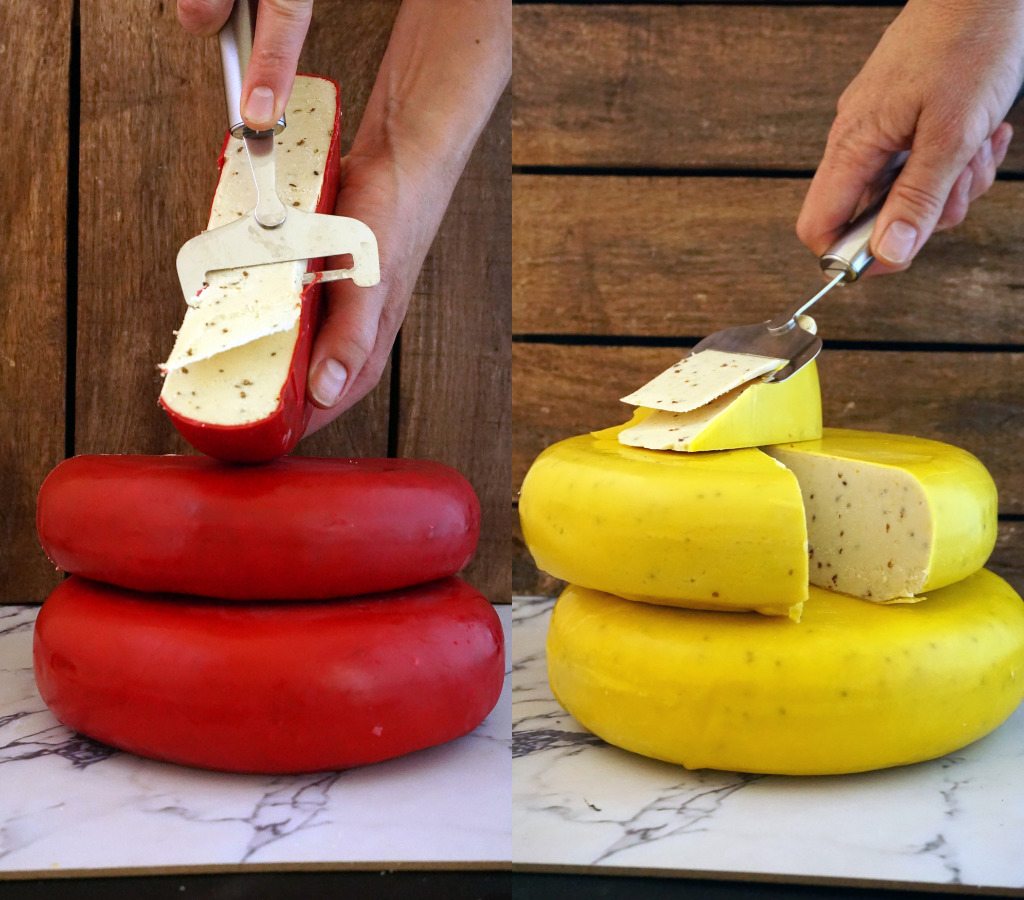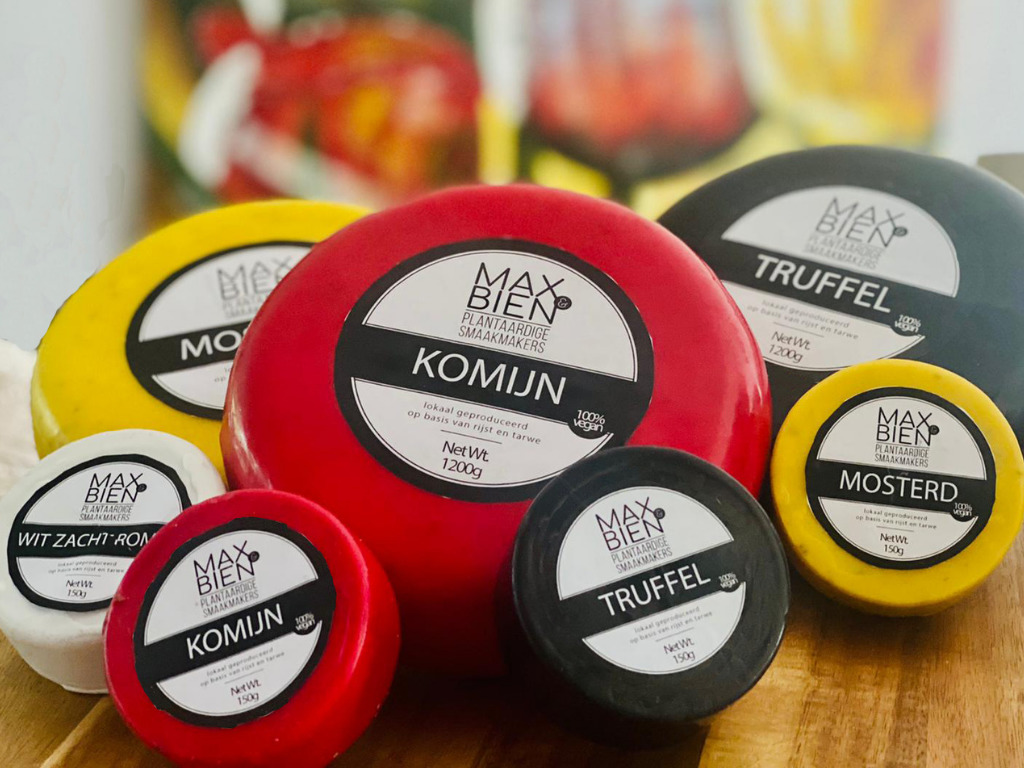5 Mins Read
Amsterdam cheese makers Max&Bien just unveiled the world’s first plant-based cheese wheel with paraffin coating. The new sliceable speciality cheeses are made from fermented wheat. From this week, consumers will be able to buy the products from cheese and delicatessen stores.
ProVeg, the international nonprofit dedicated towards building a sustainable food system called this move as an innovative step in the booming market for vegan cheese.
Replicating traditional cheesemaking
Max&Bien was founded in 2018 by Maxine Agyeman who worked as a chef for over 20 years and Jobien Groen, a scientific nutrition and health researcher.
After trying out several plant-based cheeses on the market, the duo were unhappy with how the products tasted. Taking things in their own hands, they decided to apply traditional cheesemaking methods to make vegan cheeses. Due to this, the company is able to develop layered, recognisable flavours in cheeses made from nuts, oatmeal and wheat.
Agyeman said that it is crucial for consumers to have recognisable alternatives making the shift easier to plant-based products. “The coating of cheese is an age-old technique in the cheese industry. The waxing process protects the cheese from drying out and becoming mouldy,” Agyeman said in a statement. “The cheese retains its smoothness and flavour and the shelf life is extended. We are producing 1.2 kg wheels for the cheese and delicatessen stores which want to portion themselves, but we will also be producing 150 gram mini-wheels.”

We are producing 1.2 kg wheels for the cheese and delicatessen stores which want to portion themselves, but we will also be producing 150 gram mini-wheels
Maxine Agyeman, co-founder, Max&Bien
The new sliceable speciality cheeses are available in cumin, truffle and mustard flavours.
Director at ProVeg Netherlands, Veerle Vrindts said that consumers prefer buying recognisable products. “The most popular vegan burgers are indistinguishable from hamburgers and oat milk sells best in a milk carton. That’s no different where cheese substitutes are concerned. Something which has been perfectly understood by Max&Bien.”
Cow-free cheese
Apart from this, the company has an existing range of plant-based cheeses for retail and catering setups. This includes a blue-veined cheese created from fermented nuts and a penicillium Roquefort, based on fermented oatmeal. It works quite similarly to goat’s cheese.
Vrindts added: “Their plant-based cheese wheels, equipped with a recognisable red coating, are a unique global product. This is a typical Dutch product for the sustainable consumer: it puts us in mind of the atmosphere at a traditional Alkmaar cheese market, with cheese carriers throwing large round cheeses across to each other and subsequently placing these on the carts, but made without cow’s milk. And it will also be possible for a cheese seller to allow the customer to enjoy a taste by shaving off a slice of the plant-based cheese. Just like people are used to with regular cheese.”
Read: Vegan Fromage Tour: The 10 Plant-Based Cheese Shops In The U.S.

This is a typical Dutch product for the sustainable consumer: it puts us in mind of the atmosphere at a traditional Alkmaar cheese market, with cheese carriers throwing large round cheeses across to each other and subsequently placing these on the carts, but made without cow’s milk
Veerle Vrindts, director at ProVeg Netherlands
In the past, the blue-veined cheese won the audience award at the Vegan Cheese Awards in 2020. In addition, during the Amsterdam Food Pitch, an initiative of De Kweker, its plant-based butter was voted as the ‘Best product of the year’.
One of the owners who will be selling the cheese wheel, Wilbert de Groot from Echte Liefde (True Love) cheese & delicatessen, said: “(Max&Bien’s new cheese wheels) are top quality products and we can offer the customer a sample on the spot. We are not just focussing on a new target group here. Existing customers are certainly also very curious. It’s definitely handy when someone in a group of people doesn’t eat dairy products. The customer can still put together a delicious cheese platter by adding a plant-based cheese.”
Dutch love cheese
In the Netherlands, cheese is a vital part of the country’s culture and commerce which can be traced back all the way to 1365 when trading of this product began. Traditionally, a farmer used to bring the cheese in barrows(a two-wheeled handcart) to the market and customers would sample the cheese. Through a bargaining ritual known as ‘handjeklap’, the seller and the customer would shout their price by clapping each other’s hands. The last clap would seal the deal in the sale.
There are 5 major cheese markets which take place in Gouda, Edam, Hoorn, Woerden and Alkmaar. Vrindts mentioned the Alkmaar’s 400 year old cheese market. This market mimics this traditional ritual where visitors can watch the entire selling and buying routine and the weighing of cheeses on the cheese scales.
In 2016 alone, the market for packaged hard cheese was worth around US$870 million, making Netherlands the largest cheese product market that year. Apart from this, 20 kgs of cheese is consumed with the country securing a no.10 position for the top cheese-eating countries in Europe. Plus, out of the 900 million kg of cheese produced annually, most of this is exported to other countries.
However, the plant-based industry in Netherlands is now witnessing double-digit growth with plant-based cheese recording a 400% (triple-digit growth) over the last two years alone.
According to a consumer acceptance study, more than 71% of global consumers are ready to purchase animal-free cheese products and 79% don’t mind trying them out.
Read: 10 Vegan Food Trends Taking Over TikTok, From Dairy-Free Cheese to Plant-Based Chicken
Lead image courtesy of Max&Bien.



